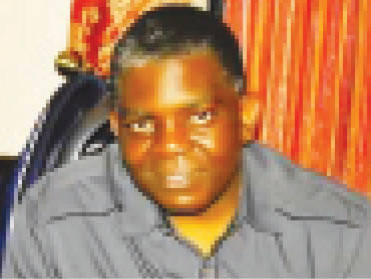
Barrister Pius Akutah Ukeyima is one of the five recipients of the 2017 Civil Service Presidential Merit Award. In this interview, he speaks on the Administration of Criminal Justice Act (ACJA), challenges of prosecution and adoption of forensic evidence in prosecution. Excerpts:
The Administration of Criminal Justice Act (ACJA), 2015 is just over two years since it became active, what do you consider its greatest contribution to the criminal justice system?
The intendment of the Act if you look at Section One is that it intends to fast track criminal trials in Nigeria. And severally within the law, you will see that the major contribution, to me is that there is no longer stay of proceedings. So, if a matter goes up to appeal, it continues because there is no stay.
In time past, we noticed how cases were being frustrated. I mean once there is an appeal up there, someone files a stay of proceeding and he is granted and that’s the end of the case. Sometimes they delay the appeal for years! And because the Court of Appeal and Supreme Court were overloaded with so much work, so much that sometimes they were unable to conclude some of these cases, cases get stuck at the trial court because of stay of proceedings and awaiting the outcome of the Court of Appeal or the Supreme Court as the case may be on one element that someone has objected to.
I think the ACJA is a good law and I encourage states to adopt it in their respective states and modify them to suit the peculiarities in their states. But overall, it is a good law that has helped to improve and fast track the administration of criminal justice.
What areas of the Act do you think need amendment for the criminal justice system to be in line with best practices?
There are areas of the Act that need amendment as several experts have suggested. But overall it’s a good law. The emphasis should not always be on the aspects that may not be so good, because the law in itself is good, but there are some aspects of it that need further legislation or further clarifications for them to be well implemented.
Some lawyers are of the opinion that the aspect of day-to-day trial as provided for in the Act is in contradiction with the provision of Section 36 of the Constitution that provides generally for fair hearing. Do you consider this as part of the challenge?
Yes, that is one. We have tried to test it but we saw how difficult it was. In Saraki’s case we tried to use it and saw how difficult it was. In Justice Ademola’s case, we actually used it and we were able to conclude the trial in record time. But then, the difficulty of it, in my mind, is not as to whether it conflicts with Section 36 of the Constitution. Once a defendant is given adequate time and facility to come before a court and you are in court, now it becomes a matter of procedure. And this is one of the aims of the Act; which is to fast track criminal trial. So, day-to-day trial is good, but it puts a lot of stress on the court and on the litigant and sometimes, it might not be feasible.
What do you consider as a prosecutor’s greatest challenge practicing in Nigeria?
My greatest challenge are the institutions themselves. As a prosecutor, when you take a case to court, your target is to win the case; though not at all cost. Before you take a case to court, you should at least have 99% guarantee that you will win the case and not just to throw the case at the court and say things like ‘sometimes you win, sometimes you lose’.
Sometimes, because of the problems such as the length of the investigation, it is more difficult. And again we have the media, because sometimes you are taking your time to prepare a case but the way the media trial goes on, people are eager to see and know what is happening with the case and already opinions are being formed.
Being a forensic expert, what do you think is the future of prosecution in Nigeria vis-à-vis forensic evidence?
A few of us that were sent for training as forensic experts decided to study further to know how to examine a computer or mobile device to be able to extract evidence from it. As a lawyer, this helps because when I look at a forensic evidence given to me, I know the procedure it went through before it was extracted and I should know if there is a problem with the evidence.
Generally speaking, prosecution around the world now is forensic-based. So, Nigeria has no choice than to imbibe the culture of using forensic evidence to prove cases.
You were one of the five recipients of the 2017 Civil Service Presidential Merit Award, what informed your choice to become a lawyer?
Well, actually it never occurred to me that I was meant to be a lawyer. I was pursuing a different career; I had wanted to be an accountant. That was obvious to me because I was good in accounting. When I finished my secondary school, I cleared all my papers, but I had a pass in accounting. Eventually I got admission into the University of Calabar to study Accounting. Somewhere along the line I had to leave the university. I could not continue because of cult activities on the campus at that time. So, I happened to go to the University of Jos which was my second choice. In the process, it was too late for me to get admission. So the only admission I could get was to study a diploma in law. So that was how the journey to becoming a lawyer started.
How was your first day before a judge?
Incidentally, before I finished studying law, I worked in the civil service commission and I was working together with lawyers, sometimes taking record of proceedings. So I became very conversant and it was not strange at all. I was called to bar on Wednesday and on Thursday I was in court and it was just like taking off on hitting the ground.
What mistake(s) did you make at your years in practice?
If I think about it, for the first I appeared before a magistrate, I wrongly addressed the presiding magistrate as My Lord, so, he had to correct me. Normally, as a lawyer you have to wait, to master your case. That’s the only way you can be fluent in court so that you will be able to handle you case very well. I also read a lot, one thing that law has ever done to me it has killed my interest in watching television

 Join Daily Trust WhatsApp Community For Quick Access To News and Happenings Around You.
Join Daily Trust WhatsApp Community For Quick Access To News and Happenings Around You.


